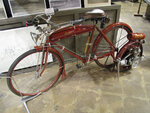6zfshdb
Well-Known Member
- Region
- USA
- City
- Northeast Pennsylvania
Please don't misunderstand. I am fully supportive of the E-bike concept and I ask these questions out of curiosity, not animosity. I sometimes wonder if the same principle could have been achieved with small quiet gas powered "G-bikes".
Motorized bicycles have been around for over a century. As a young boy, I remember my grandfather riding around on his bike equipped with a Smith Motor Wheel. It was surprisingly quiet and couldn't be heard more that a few yards away. It looked something like this one:

You can buy a gas conversion kit for less than $200.
Why spend 4 or 5 times that for an electric kit?
Manufacturers could easily produce a lightweight, quiet, gas powered, pedal assist / throttled "G-bike" bike that conforms to the 3 class system, so why is the electric concept so popular? When it comes to automobiles, I can understand the economics. They are also Eco friendly when you consider the millions of tons of CO2 pumped into the atmosphere by gasoline engines. The carbon footprint of a G-bike would be minuscule in comparison. They would be just as effective at reducing the number of cars on the road as E-bikes. The idea would be similar to the moped but lighter and more agile.
There are many threads here on EBR which discuss maximum range, carrying spare batteries, charging on the road, even carrying a gas generator. Why go through all this time, effort and expense with an E-bike when you could just pull your G-bike into any gas station???
Yes, there are currently license, insurance and registration issues associated with gasoline powered vehicles. Why would this apply to G-bikes when they would be effectively the same as E-bikes in every way except the method of propulsion?
A G-bike would be more economical in the long run. Yes, there are fuel & maintenance costs associated with gas engines but these would be considerably less than replacing a lithium battery every 4 or 5 years.
The only down side I can see to a G-bike is in the regulatory arena. Pro E-bike organizations have enough trouble with anti E-bike laws. Promoting G-bikes would be much harder since they would be much more difficult to distinguish from motor bikes, mopeds and motorcycles.
Please remember, I'm posting this as a discussion, not a criticism. All comments are welcome.
Motorized bicycles have been around for over a century. As a young boy, I remember my grandfather riding around on his bike equipped with a Smith Motor Wheel. It was surprisingly quiet and couldn't be heard more that a few yards away. It looked something like this one:

You can buy a gas conversion kit for less than $200.
Why spend 4 or 5 times that for an electric kit?
Manufacturers could easily produce a lightweight, quiet, gas powered, pedal assist / throttled "G-bike" bike that conforms to the 3 class system, so why is the electric concept so popular? When it comes to automobiles, I can understand the economics. They are also Eco friendly when you consider the millions of tons of CO2 pumped into the atmosphere by gasoline engines. The carbon footprint of a G-bike would be minuscule in comparison. They would be just as effective at reducing the number of cars on the road as E-bikes. The idea would be similar to the moped but lighter and more agile.
There are many threads here on EBR which discuss maximum range, carrying spare batteries, charging on the road, even carrying a gas generator. Why go through all this time, effort and expense with an E-bike when you could just pull your G-bike into any gas station???
Yes, there are currently license, insurance and registration issues associated with gasoline powered vehicles. Why would this apply to G-bikes when they would be effectively the same as E-bikes in every way except the method of propulsion?
A G-bike would be more economical in the long run. Yes, there are fuel & maintenance costs associated with gas engines but these would be considerably less than replacing a lithium battery every 4 or 5 years.
The only down side I can see to a G-bike is in the regulatory arena. Pro E-bike organizations have enough trouble with anti E-bike laws. Promoting G-bikes would be much harder since they would be much more difficult to distinguish from motor bikes, mopeds and motorcycles.
Please remember, I'm posting this as a discussion, not a criticism. All comments are welcome.

